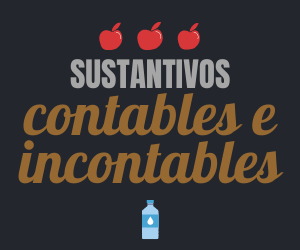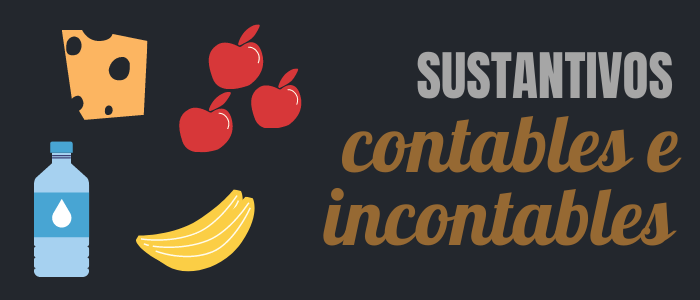Category: Gramática
Un sustantivo es una palabra o grupo de palabras que se usa para nombrar a una persona, lugar, cosa o idea. Algunos sustantivos son contables y otros incontables, y algunos pueden ser ambas cosas. Veamos a continuación la diferencia entre cada categoría:
Countable nouns - Sustantivos contables
Los sustantivos contables son aquellos que se pueden contar y tienen forma en singlar o plural. Pueden ir precedidos por el articulo indefinido "a" o "an". También pueden ir precedidos por números o el articulo definido "the". Los plurales regulares se forman agregando simplemente "-s" al final.
| Ejemplos de sustantivos singulares:
| Ejemplos de sustantivos plurales:
|
Sin embargo, algunos sustantivos contables tienen formas plurales irregulares:
|
|
Uncountable nouns - Sustantivos incontables
Los sustantivos incontables son aquellos que no se pueden contar y solo tienen forma en singular. Estos sustantivos no pueden usarse con números.
Ejemplos:
|
|
|
Al no admitir el plural, se puede agregar un modificador:
Ejemplos:
- A piece of cake - Un pedazo de pastel.
- Two bottles of water - Dos botellas de agua.
- Eight slices of pizza - Ocho rebanadas de pizza.
- A piece of information - Un dato.
- An item of clothing - Una prenda de vestir.
- A loaf of bread - Una barra de pan.
- Two glasses of wine - Dos copas de vino.
- A bar of soap - Una barra de jabón.
- A chunk of cheese - Un trozo de queso.
- 3 cups of coffee - 3 tazas de café.
Quantifiers - Cuantificadores
En inglés, un cuantificador es una palabra que indica un número (sustantivos contables) o una cantidad (sustantivos incontables).
Cuando queremos saber la cantidad o cantidad de algo, hacemos preguntas que comienzan con How many o How much.
Cuando queremos saber la cantidad o cantidad de algo, hacemos preguntas que comienzan con How many o How much.
Con sustantivos contables usamos "How many"
Ejemplos:
Ejemplos:
- How many apples are there? - ¿Cuántas manzanas hay?
- How many friends do you have? - ¿Cuántos amigos tienes?
- How many glasses of wine do you want? - ¿Cuántas copas de vino quieres?
Con sustantivos incontables usamos "How much"
Ejemplos:
- How much milk is there? - ¿Cuánta leche hay?
- How much bread should I bring? - ¿Cuánto pan debo traer?
- How much money have you got? - ¿Cuánto dinero tienes?
Podemos usar diferentes palabras y expresiones para cuantificar los sustantivos contables e incontables.
For countable nouns |
For uncountable nouns |
many There are a many apples. Hay muchas manzanas. |
much I don't have much time. No tengo mucho tiempo. |
so many Why are there so many chairs in the room? ¿Por qué hay tantas sillas en la habitación? |
so much There isn't so much food in the fridge. No hay tanta comida en la nevera. |
too many There are too many people in the club. Hay demasiada gente en el club. |
too much There’s too much sugar in this coffee. Hay demasiada azúcar en este café. |
a lot of The children have a lot of toys. Las niñas tienen muchos juguetes. |
a lot of My mom has a lot of furniture. Mi mamá tiene muchos muebles. |
some I have some candies. Tengo algunos dulces. |
some Would you like some water? ¿Quieres un poco de agua? |
few Few people came to the party. Pocas personas vinieron a la fiesta. |
little They have little money. Ellos tienen poco dinero. |
a few I have a few cups of coffee every morning. Tomo algunas tazas de café todas las mañanas. |
a little Gwen has a little free time tomorrow. Gwen tiene algo de tiempo libre mañana. |
a lot of The children have a lot of toys. Las niñas tienen muchos juguetes. |
a lot of My mom has a lot of furniture. Mi mamá tiene muchos muebles. |
any There aren’t any students in the classroom. No hay ningún estudiante en el aula. |
any There isn't any meat. No hay ninguna carne. |
Excepciones: Sustantivos incontables que pueden ser contables
Ejemplos:
Uncountable nouns |
Countable nouns |
cake I'm eating some cake. Estoy comiendo pastel. |
cake My mom bought two cakes. Mi mamá compró dos pasteles. |
time I can’t wait a lot of time. No puedo esperar mucho tiempo. |
time I already told you three times that you can’t go to the party. Ya te dije tres veces que no puedes ir a la fiesta. |
egg There's some egg on the floor. Hay huevo en el suelo. |
egg I'm frying two eggs. Estoy friendo 2 huevos. |


